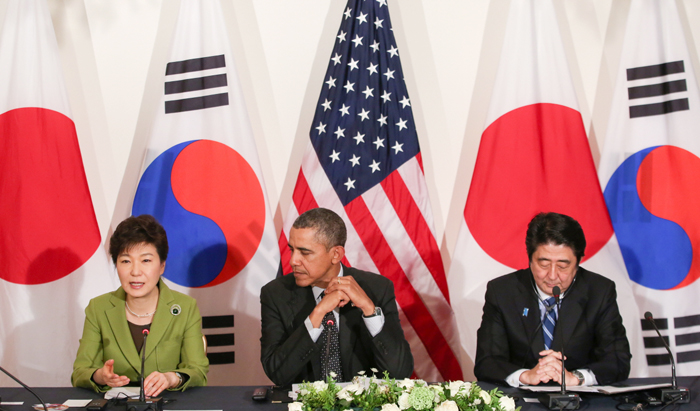The Peninsula
U.S. Should Encourage Greater South Korea-Japan Security Cooperation
Published June 21, 2016
Category: South Korea, Japan

By Bruce Klingner
Enhanced security cooperation between Seoul and Tokyo would better protect South Korean, Japanese, and U.S. national interests in Asia. Both South Korea and Japan have extensive, highly capable militaries. Washington has strong relationships with both countries, but the third leg of the security triad—between Seoul and Tokyo—has been constrained due to bitter historic animosities and territorial disputes.
However, driven by common concerns over North Korea’s growing security threat, Seoul and Tokyo began in recent years to augment the scope and sophistication of bilateral security relations. In addition, the December 2015 South Korean-Japanese comfort women agreement allowed both nations to begin to shift attention away from contentious history issues toward present-day security challenges.
North Korea’s 2016 nuclear and missile tests underscored the necessity of further coordinating and integrating defense cooperation amongst the U.S., South Korea, and Japan. A combined trilateral ballistic missile exercise in June 2016 is the latest manifestation of slowly improving security ties between Seoul and Tokyo.
The U.S. had sought to remain aloof from the diplomatic clashes between its two critical Asian allies, but eventually realized the necessity of playing a behind-the-scenes facilitator. Washington can best empower increased security cooperation by embedding South Korean-Japanese defense relations into broader multilateral security initiatives while maintaining the stabilizing effect from a robust forward-deployed U.S. military presence in the region.
The foundation for enhancing security cooperation is increasing and formalizing information exchange amongst the three militaries. Doing so would enable an accelerated and upgraded allied response to a North Korean attack. In June 2012, South Korea was scheduled to sign a General Security of Military Information Agreement (GSOMIA) with Japan but cancelled at the last moment due to strong domestic opposition.
In December 2014, a limited version of the accord was signed which permitted some military information to be exchanged on North Korean ballistic missile and nuclear activities but only indirectly and inefficiently through the U.S. military. Privately, South Korean security officials acknowledge the need to expand defense cooperation with Japan but counsel that such efforts should remain largely unpublicized or buried within larger multilateral efforts lest they be derailed by Korean nationalism.
While a formal GSOMIA may currently be a bridge too far, Seoul and Tokyo should push the envelope on expanding security cooperation allowable under the current trilateral agreement while educating their populaces on the need to address the threats of the present millennium rather than remained mired in the past. A GSOMIA could also become a confidence-building measure leading to even more meaningful bilateral military cooperation.
Washington, Seoul, and Tokyo should create a Trilateral Security Initiative (2+2+2 meeting) with an annual meeting of foreign and defense ministers to develop joint strategies for addressing common threats and objectives. Formalizing integrated trilateral security policymaking would encourage development of a joint strategic vision that better incorporates the roles, missions, and capabilities of their militaries.
The initiative should focus initially on coordinated defense cooperative initiatives to improve allied deterrence and defense against the common North Korean security threat. A critical component would be integrated ballistic missile defense. To date, Seoul has resisted linking its independent Korea Air and Missile Defense system into the more comprehensive and effective allied network due to tensions with Tokyo. By capitulating to populist nationalism, Seoul has increased the risk to U.S. forces in the region as well as to its own citizens to attack by North Korean nuclear, chemical and biological strikes.
Concurrent with enhancing defenses against North Korea, the three countries should discuss bilateral or trilateral combined operations for peacekeeping, maritime security, counterterrorism, counter-proliferation, counter-narcotics, anti-submarine warfare, minesweeping, cyberspace protection, and humanitarian assistance and disaster response. Eventually, multilateral planning could facilitate long-term plans for achieving Korean unification.
Maritime operations may provide the most likely venue for augmenting cooperation given their unobtrusive over-the-horizon nature out of public view. As such, the U.S., South Korea, and Japan should enhance bilateral and trilateral naval exercises. Due to Korean sensitivities, combined training can occur far from the Korean Peninsula. For example, mine-sweeping exercises near the Strait of Hormuz and anti-piracy operations in the Gulf of Aden not only serve common allied interests, but also develop skills and familiarity that could be applied in a Korean crisis.
Washington, Seoul, and Tokyo should particularly emphasize trilateral cooperation in anti-submarine warfare (ASW) and mine warfare. Despite ASW initiatives in response to the Cheonan sinking in 2010, South Korea remains vulnerable to North Korean submarines nor can it protect the sea lines of communication around the Korean Peninsula. The United States has an insufficient number of naval assets permanently stationed around South Korea’s vital sea lanes, but Japan has strong ASW and mine-sweeping capabilities.
The U.S. has critical national interests in Asia, but cannot protect them alone. It must rely on indispensable allies such as Japan and South Korea to achieve mutually beneficial goals. Greater South Korean–Japanese security cooperation would augment allied deterrence and defense capabilities. A strong security triad could also form a core group for addressing broader regional issues.
Japanese–South Korean rapprochement has a viable path forward, but it will not be easy. Both President Park Geun-hye and Prime Minister Shinzo Abe must continue to consolidate progress since the comfort women agreement by pushing back against the fervent nationalist elements in their countries that have previously worked against reconciliation. The United States must remain fully and energetically engaged by maintaining its forward-deployed forces in Asia and constantly seeking ways to promote rapprochement between Seoul and Tokyo.
Bruce Klingner is Senior Research Fellow for Northeast Asia at the Heritage Foundation. He previously served 20 years with the Central Intelligence Agency and Defense Intelligence Agency.
Photo from Korea.net.
